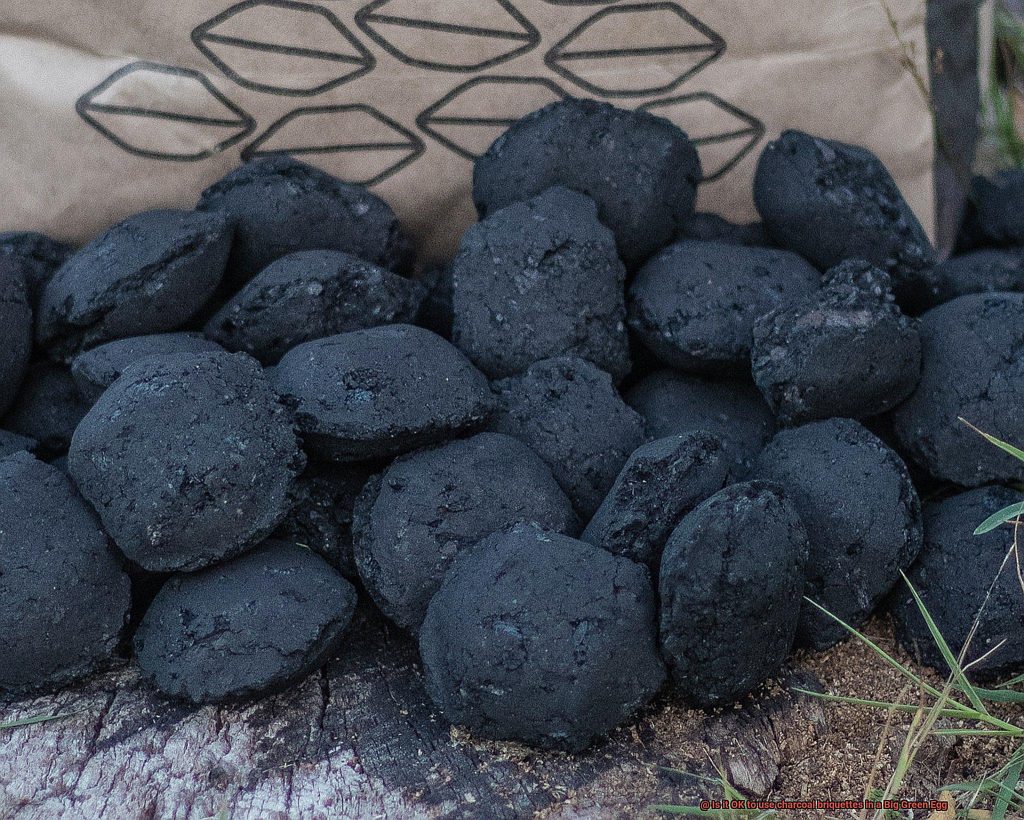Are you a vegetable lover who sometimes forgets to store your greens properly? Or, perhaps you’re wondering if that salad you left out overnight is still safe to eat? As someone who knows the ins and outs of food safety, I’m here to help ease your worries.
Imagine this: after a long day, all you want is a refreshing salad. You chop up some crisp lettuce, juicy tomatoes, and crunchy cucumbers before calling it a night. The next morning, you realize that you left your veggies on the counter all night long – yikes. Can you still eat them without getting sick? Well, it’s not that simple.
In this blog post, we’ll dive into the potential dangers of consuming vegetables that have been left out overnight. We’ll also share essential tips on how to store your veggies correctly to avoid any foodborne illnesses. Plus, we’ll provide expert advice on handling your greens like a pro.
So if you’re looking for ways to keep your daily dose of greens fresh and safe for consumption, keep reading. We’ve got everything you need to know about eating vegetables left out overnight.

Contents
What is the Risk of Eating Vegetables Left Out Overnight?
While vegetables are a crucial part of a healthy diet, it is important to store and handle them properly to minimize any health risks.
The major risk of consuming vegetables that have been left out overnight is the development of harmful bacteria, which can cause food poisoning. Bacteria can grow rapidly on vegetables that are not stored properly, especially in warm temperatures. The toxins produced by these harmful bacteria can cause symptoms such as nausea, vomiting, diarrhea, and abdominal pain that can vary in severity and last for several days.
It is important to note that certain types of vegetables are more susceptible to bacterial growth than others. Leafy greens and other raw vegetables are particularly vulnerable due to their higher water content, which creates an ideal environment for bacterial growth. Therefore, it is crucial to ensure that these vegetables are refrigerated as soon as possible after purchase or preparation.
Moreover, the risk of bacterial growth increases with the temperature of the environment. Vegetables left out in warm temperatures are at a higher risk of developing harmful bacteria than those kept in cooler temperatures. Hence, it is advisable to store vegetables in the refrigerator at or below 40°F (4°C) to prevent bacterial growth.
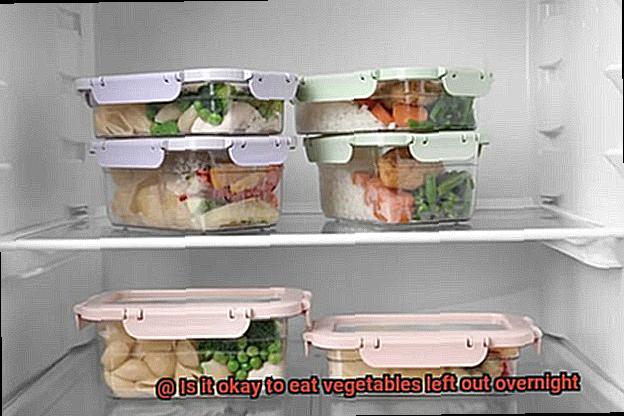
To minimize any health risks associated with consuming vegetables, it is crucial to handle them properly from the moment you purchase or prepare them. Here are some tips to keep your vegetables safe:
- Wash your hands thoroughly before handling any vegetables.
- Store leafy greens and other raw vegetables in the refrigerator as soon as possible after purchase or preparation.
- Keep hot foods hot and cold foods cold to prevent bacterial growth.
- Store vegetables in airtight containers or sealed plastic bags to prevent contamination from other foods.
- Discard any vegetables that have been left out for more than two hours or that look or smell questionable.
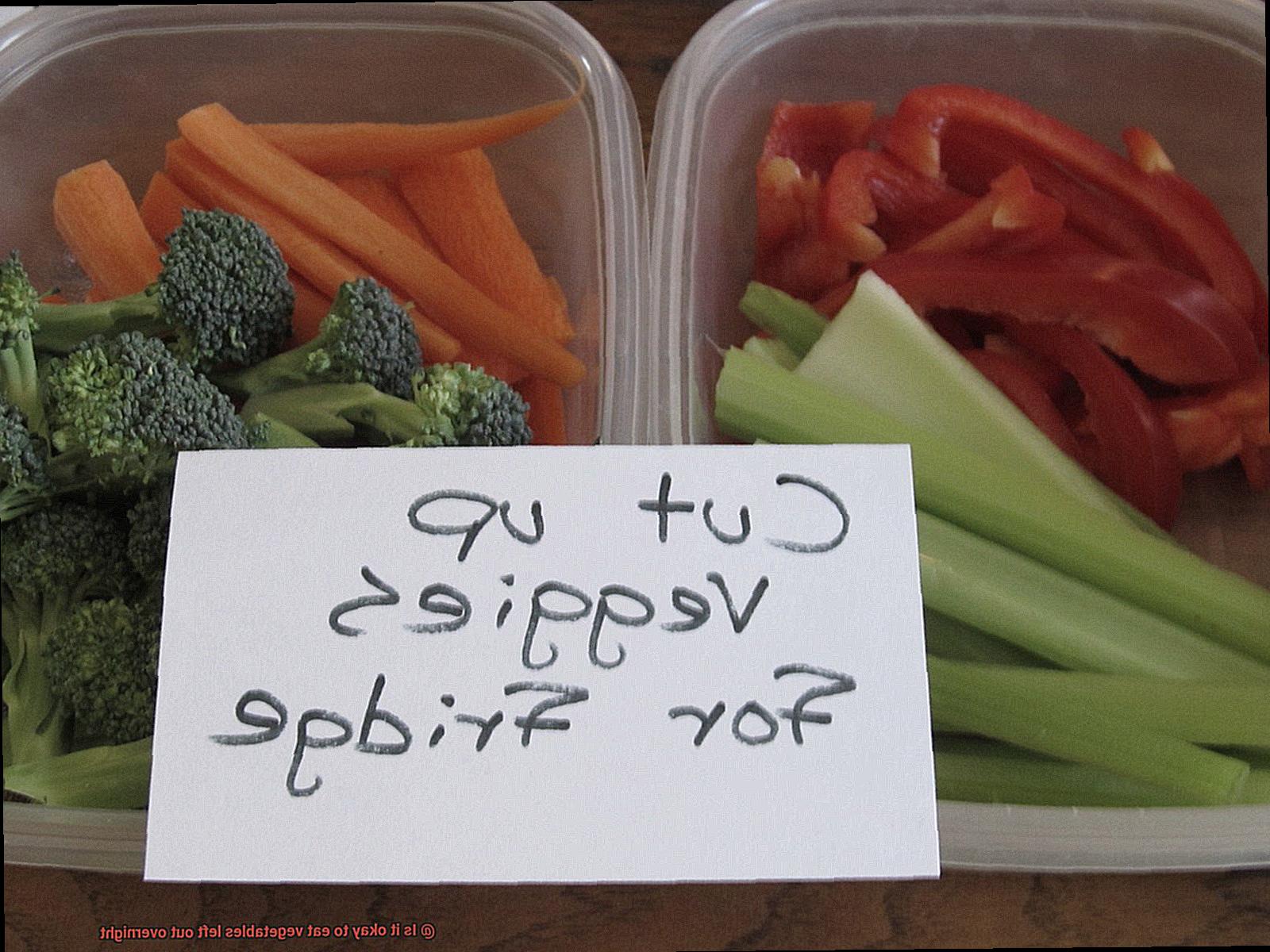
Factors to Consider When Deciding Whether to Eat Vegetables Left Out Overnight
Before taking a bite, there are several critical factors that you should consider.
The type of vegetable is the first factor to keep in mind. Delicate greens like spinach and lettuce are more prone to spoilage than hardier vegetables like carrots or potatoes. If you find that your leafy greens have been left out overnight, it’s better to err on the side of caution and dispose of them.
Temperature is another vital consideration. If vegetables were left out at temperatures above 40 degrees Fahrenheit, harmful bacteria may have grown on them, making them unsafe for consumption. To prevent bacterial growth, always store your vegetables in the fridge at or below this temperature.
The length of time that the vegetables were left out is also crucial. Perishable foods should not be left out at room temperature for more than two hours, according to the USDA. If your vegetables have been left out for longer than this period, it’s best to throw them away.
If your vegetables were cooked before being left out, they may be safer to eat than raw vegetables. Cooking can kill some harmful bacteria that may have grown on them. However, you should still consider other factors such as the type of vegetable and how long it was left out.
Which Vegetables Can Tolerate Being Left Out for Longer Periods?
Fear no more. As a vegetable expert, I’ve got the inside scoop on which veggies can tolerate being left out for longer periods.
The primary factor that determines a vegetable’s ability to withstand being left out is its water content. Leafy greens and cucumbers, with their higher water content, are more prone to spoilage when left out at room temperature. So, if you’ve got a salad sitting out for too long, it might be time to toss it.
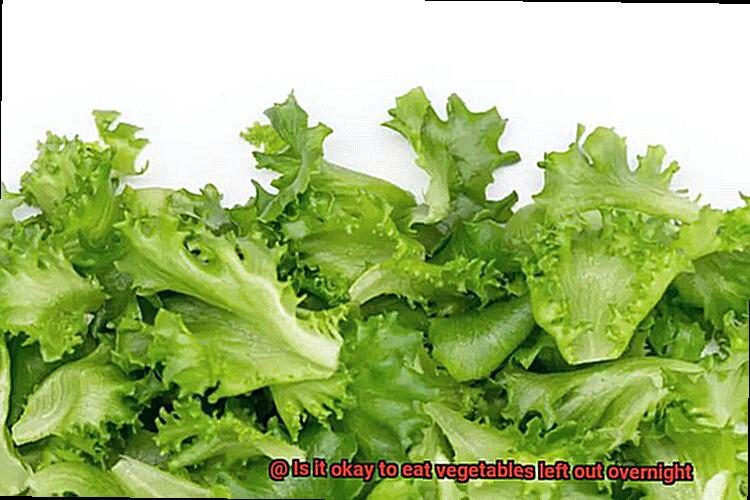
But fear not. Root vegetables like potatoes and carrots have a lower water content and can typically tolerate being left out for longer periods without spoiling. Forgot to put away those roasted veggies after dinner last night? They’re probably still good to eat.
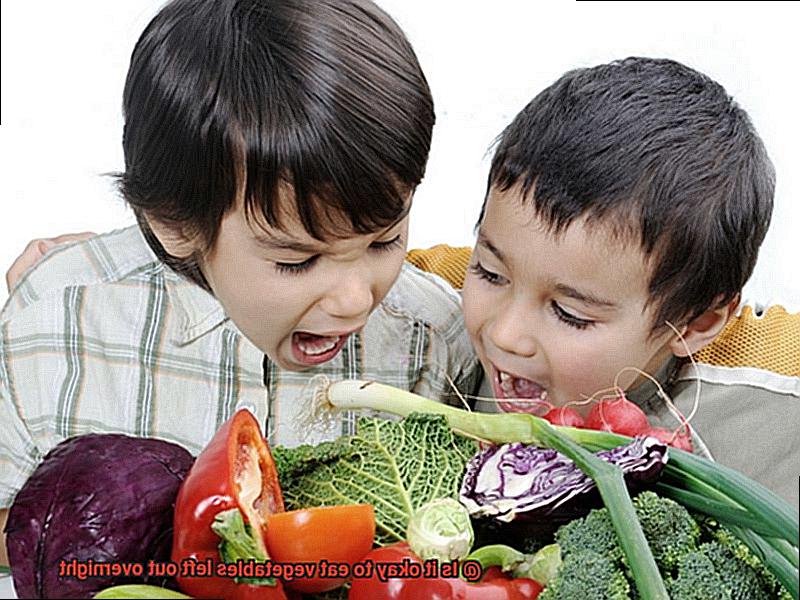
And it gets better – hardier vegetables like broccoli and cauliflower also have a lower water content and can tolerate being left out longer. That means that roasted broccoli from lunchtime is probably safe to eat as an afternoon snack.
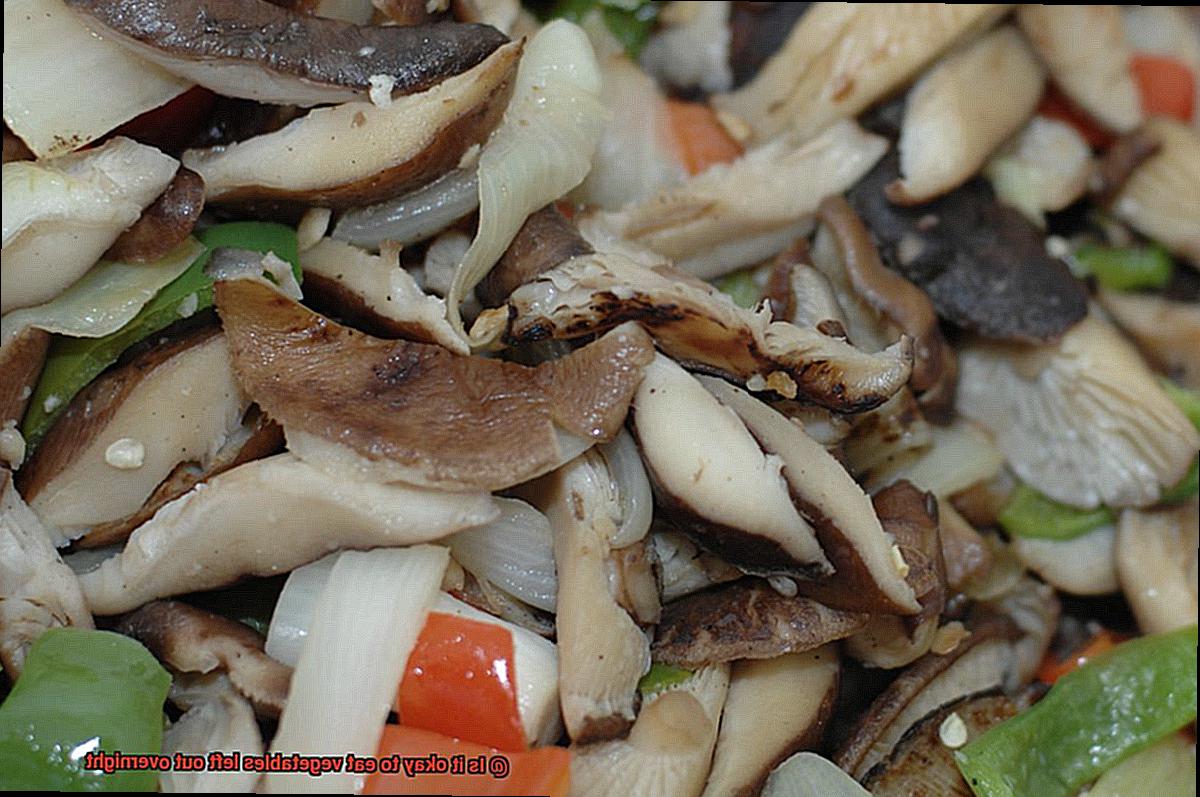
However, it’s important to remember that even vegetables with a lower water content can eventually spoil if left out for too long. To prevent any potential spoilage, it’s best to store all vegetables in the refrigerator after a few hours of being left out at room temperature.
Leafy Greens and Their Susceptibility to Bacterial Growth
With their high vitamin and mineral content, they provide numerous health benefits. However, it’s important to handle them with care, as they can easily become a breeding ground for bacteria.
When leafy greens are left out overnight, they become susceptible to bacterial growth. At room temperature, harmful bacteria like E.coli, Salmonella, and Listeria can multiply rapidly on the surface of the leaves, leading to contamination. This is why proper storage is crucial to maintaining their freshness and nutritional value.
To keep your leafy greens safe from bacterial growth, start by washing them thoroughly with cold water and drying them using a clean towel or salad spinner. Once they are dry, store them in an airtight container in the refrigerator at a temperature of 40°F or below. This will help prevent harmful bacteria from multiplying and causing illness.
If you accidentally leave your leafy greens out overnight, it’s important to inspect them carefully before consuming them. If there are any signs of discoloration or wilting or if they have a foul odor, it’s best to discard them. This is especially important if you’re serving leafy greens to young children or elderly adults who are more vulnerable to foodborne illness.
It’s worth noting that E.coli is the most common bacteria found on leafy greens and can cause severe food poisoning. But other harmful bacteria like Salmonella and Listeria can also grow on leafy greens and cause illness.
In summary, here are some key points to remember when handling leafy greens:
- Wash and dry them thoroughly before storage
- Store them in an airtight container in the refrigerator at 40°F or below
- Inspect them carefully before consuming them
- Discard any leaves with discoloration, wilting, or foul odor
- Avoid serving leafy greens that have been left out overnight to those who are more vulnerable to foodborne illness
Refrigerating Vegetables After Purchase or Preparation
After purchasing or preparing your veggies, it’s crucial to refrigerate them promptly to prevent bacterial growth and spoilage.
Leaving your vegetables out overnight can expose them to a range of temperatures, leading to harmful bacteria multiplication. This can cause food poisoning, which is why it’s important to avoid leaving your vegetables outside the fridge for prolonged periods.
Did you know that some vegetables have shorter shelf lives than others? Leafy greens are more prone to wilting faster than root vegetables like carrots and potatoes. To get the most nutritional value from your veggies, it’s advisable to consume them as soon as possible after purchasing or preparing them.
To keep your greens fresh, store them in an airtight container or plastic bag in the refrigerator. Before storing them, ensure that you wash them thoroughly to remove any dirt or bacteria. For certain veggies, blanching before storing can help extend their shelf life.
The Health Risks of Eating Vegetables Left Out Overnight
As a vegetable connoisseur, you want to savor their freshness and ensure they’re safe for consumption. It may seem convenient to leave your veggies out overnight, but the health risks associated with doing so are not worth the trouble.
Vegetables are highly perishable and can quickly become a breeding ground for harmful bacteria if left out for too long. This is particularly true for leafy greens and root vegetables, which are more susceptible to bacterial growth than other vegetables. Leafy greens with their high water content can easily harbor bacteria like Salmonella and E. coli, while root vegetables like potatoes and carrots can develop molds that produce mycotoxins, which can cause illness if ingested.
The duration of time the vegetables have been left out also matters. The longer they sit at room temperature, the higher the risk of bacterial growth and contamination, making it unsafe for consumption.
Besides bacterial growth, leaving vegetables out overnight can also cause nutrient loss. Vegetables contain essential vitamins and minerals that can degrade when exposed to heat and light. By leaving them out at room temperature, you’re potentially exposing them to harsh lighting conditions that can cause nutrient degradation.
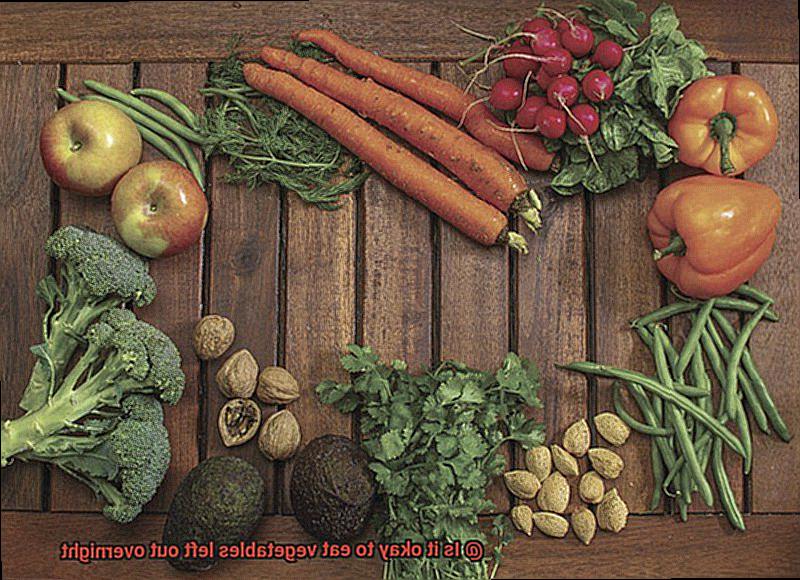
Tips for Storing Vegetables Properly
Vegetables are perishable items and can spoil easily if not stored properly. Here are some tips for storing vegetables properly:
Keep it Cool
Most vegetables need to be stored in a cool place, preferably between 32°F and 40°F. This can be achieved by storing them in the refrigerator or a cool cellar. Some vegetables like onions and potatoes can be stored at room temperature, but they will still last longer if stored in a cool and dry place.
Don’t Wash Before Storing
Washing your vegetables before storing them can cause them to spoil faster due to excess moisture that leads to bacterial growth. Instead, wash them just before use to keep them fresh.
Store in Breathable Containers
Vegetables need air circulation to stay fresh, so it’s best to store them in breathable containers like mesh bags or perforated plastic bags. These containers allow air to circulate and prevent moisture from building up.
Keep Them Dry
Moisture can cause vegetables to rot quickly, so it’s important to keep them as dry as possible. You can wrap leafy greens in paper towels to absorb excess moisture and keep them fresh for longer periods.
Store Them Separately
Some vegetables like tomatoes and apples release ethylene gas which can cause other nearby vegetables to ripen and spoil faster. It’s best to store these types of vegetables separately to prevent this from happening.
By following these tips for storing vegetables properly, you can ensure that your produce stays fresh and safe to eat for longer periods of time. However, it’s important to note that even with proper storage, vegetables should not be left out at room temperature for more than 2 hours, as this can increase the risk of bacterial growth and food poisoning.
RQBOJriKXSA” >
Conclusion
In the end, whether or not you should eat vegetables that have been left out overnight is a tricky question. The primary concern is the growth of harmful bacteria on improperly stored veggies, which can lead to food poisoning. Bacteria thrive in warm temperatures and can quickly spread on vegetables that are not handled with care. However, some types of veggies like root vegetables and hardier greens can tolerate being left out for longer periods than others.
To keep your health risks at bay when consuming veggies, it’s essential to handle them properly from purchase or preparation. You must start by washing your hands thoroughly before handling any veggies. Then, store leafy greens and other raw vegetables in the refrigerator as soon as possible after purchase or preparation to prevent bacterial growth. Also, keep hot foods hot and cold foods cold to avoid contamination from bacteria. Store your veggies in airtight containers or sealed plastic bags to minimize exposure to other foods.
It’s crucial to discard any veggies that have been left out for more than two hours or that look or smell questionable. With these tips for storing and handling your veggies like a pro, you can enjoy all their nutritional benefits without worrying about getting sick.
Always inspect your veggies carefully before consuming them; it’s an excellent way to ensure they’re fresh and safe for consumption.

